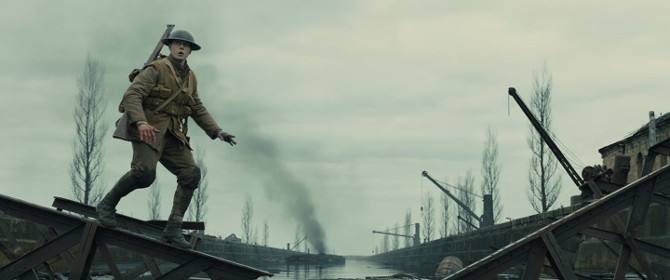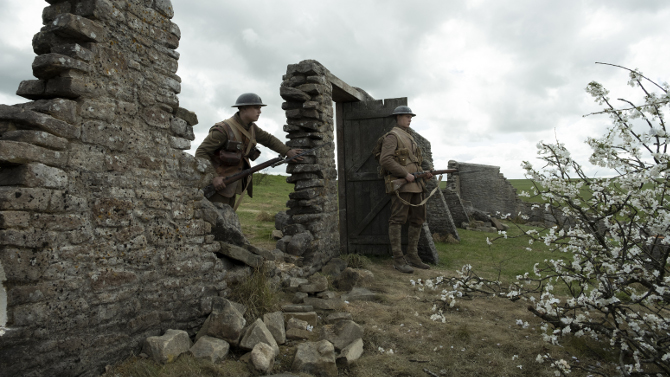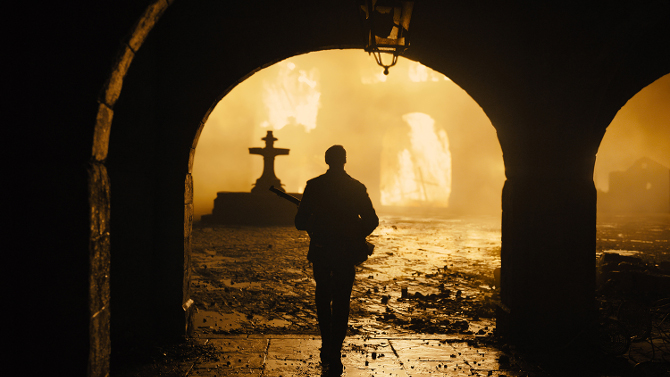 For whatever reason, World War 1 films have never been popular fodder for Hollywood studios. Since World War 2, money makers have obsessed over this more modern conflict, leaving the War to End All Wars behind. Skewed some ten to one in favour of the 1939-1945 clash, it is refreshing to see Sam Mendes’ 1917 (which he co-writes and directs) coming out exactly one hundred years after the end of The Great War.
For whatever reason, World War 1 films have never been popular fodder for Hollywood studios. Since World War 2, money makers have obsessed over this more modern conflict, leaving the War to End All Wars behind. Skewed some ten to one in favour of the 1939-1945 clash, it is refreshing to see Sam Mendes’ 1917 (which he co-writes and directs) coming out exactly one hundred years after the end of The Great War.
Following Lance Corporal Blake (Dean-Charles Chapman – Tommen Baratheon in Game of Thrones) and Lance Corporal Schofield (George MacKay – Captain Fantastic), it is not surprising to first find them in a fugue-like state of nap. . . for they are now four years into a war that seems to have no end. Tasked with making a lengthy journey by dawn, the pair will have to deliver a message warning a battalion of sixteen hundred men, including Blake’s brother, Joseph (Richard Madden), that they are running into an elaborately plotted trap.
Before truly delving into the story, many of you have probably already heard that the entire film is shot to look like one take – with Mendes being inspired by his eight minute long extended take found at the beginning of the 2015 James Bond movie Spectre. What can be seen as 1917’s greatest strength and also perhaps its prime weakness, the narrative settles into your mind (likely several days later), and you eventually come to realize just how clever this one take premise actually is.
Though at first seeming like it slows the action right down to a snail’s pace, in essence, this is the goal. The pair is tasked with making a miles-long journey through the former French countryside (and now war-torn landscape), we too feel the unnerving silence as the duo trudge through this haunting world. Miles feel like miles, and that is exactly the point. We in the audience feel the gargantuan task placed on these two soldiers’ shoulders, uncomfortably finding ourselves in their boots as we too are on high alert when met with an eerie silence – no gunfire, simply the ghostly path of dead bodies, and surprisingly, nothing else.
In essence, you can break the film into three meetings: the opening sequence finds the pair receiving their ominous task from General Erinmore (Colin Firth), while around the middle of the film there is a chance run-in with Captain Smith (Mark Strong), with the closing bookend being Colonel MacKenzie (Benedict Cumberbatch).
Yet, in reality, it is all about Blake and Schofield. Travelling with them through the claustrophobic British trenches, then the disturbing no man’s land, and into the German front, their trek is that of nightmarish horror. Dismembered and bloated bodies litter no man’s land, while barbed wire, craters, endless mud, and burning trees lie where the once picturesque French countryside used to lay.
Intriguingly, there are also two very noticeable moments. One finds the pair, after journeying through an underground tunnel built by the Germans, coming out the other side. After walking through endless giant shells and burnt guns left behind by the Germans and making their way through a forest, they come upon a small river that runs through a view meant for a painting. A solid stone home the only residence in sight, it rests alongside the water, with barn and stunning cherry trees in full bloom (somewhat reminiscent of a momentous scene in John Boorman’s Excalibur), a dream-like vision teetering on nightmare. For all of its beauty, it is too quiet. . . no mother and father working the land, no children playing around, simply stone cold silence. Even beautiful perfection has been flawed by this endless war. The second moment comes when Schofield finds himself hiding from German troops in what was once a city. . . happening upon a young French woman (Claire Duburcq) and a baby (not her own) in a basement (they themselves hiding). For an instant, it feels like a warped vision of the future, an instant safety and caring between the triumvirate – like this could be the man’s life if not for the war (or perhaps is what he left behind. . . for we truly do not know). It is perilous temptation and hope in a land with none (and where those thoughts do nothing but endanger and distract the lives of young men). It truly is fascinating to see these two visions of past life disfigured by the war – a weird juxtaposition that finds these moments of beauty and love twisted and distorted by the present situation.
Bold, brazen and beautiful (in a disturbing way), 1917’s one take is an immersive example of masterful film making. A rare feat to be sure, very few directors have attempted such a challenging task. . . Alfred Hitchcock did it with 1948’s Rope, Russian Ark (2002 – directed by Alexander Sokurov) and Victoria (2015 – directed by Sebastian Schipper – and reviewed here at Filmizon.com) actually shot the entire narrative in one take. . . while there are a few other examples, 1917 is arguably the most complex. Taking us on a miles long journey, every step has to be measured, intricately plotted in order to achieve this awe-inspiring goal. For we must see where they are going, what their reactions are, while every piece of action and visual gag must be caught in order to succeed in bringing the viewer into these two mens’ boots – and, I must say, though I can guess where most of the cuts are hidden, they are so well done that you truly cannot be sure. And then, Mendes along with cinematographer icon Roger Deakins, almost like they are showing off, transition to nighttime. . . some of the most visually striking moments of the year in film.
A true feat of film making, 1917 is intricate in every last detail. Though people will immediately talk of its one take premise, the set design is just as impressive. Digging over 5,200 feet of trenches to capture this most important aspect of World War 1, like in Stanley Kubrick’s Paths of Glory, they masterfully capture the tight corridors, claustrophobia, horror and chaos found in such a small space (two trenches divided by a minuscule section of land in-between). Everything is measured, even the sun. . . look for it to make an appearance only once during the film’s entire runtime. So, see an important picture of our collective past, the message is as vital today as ever.





